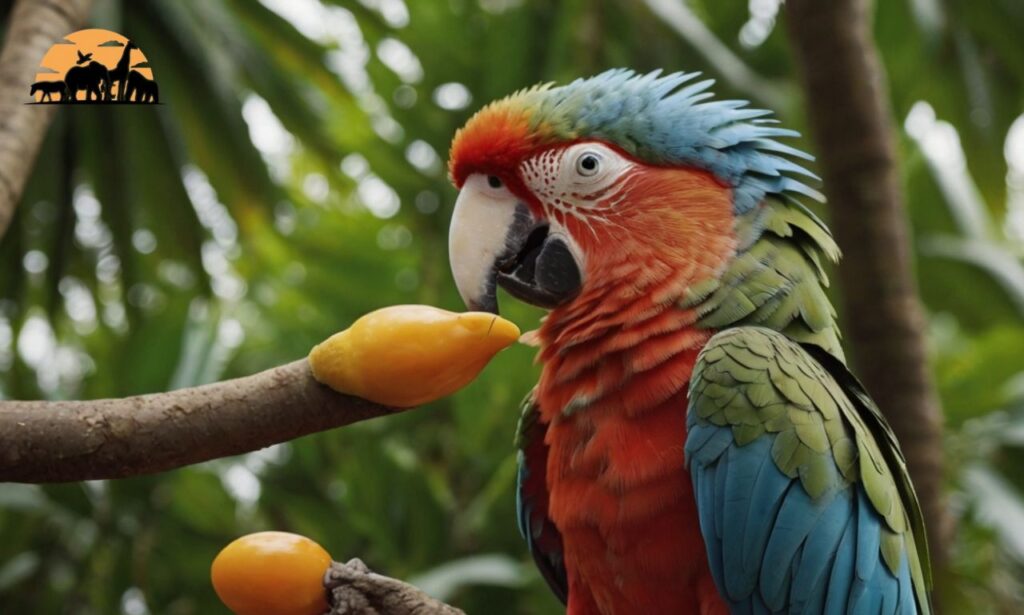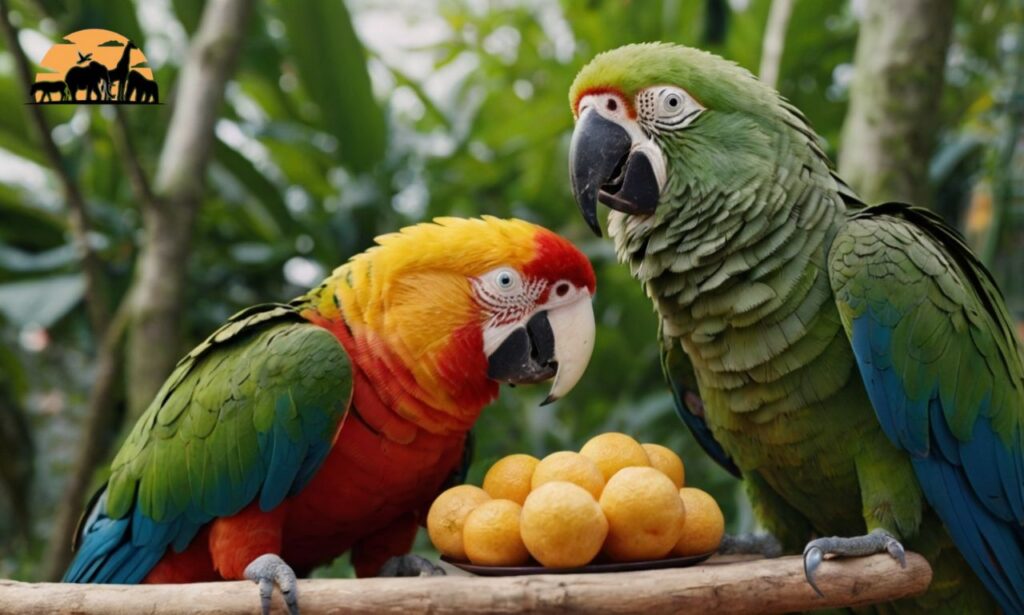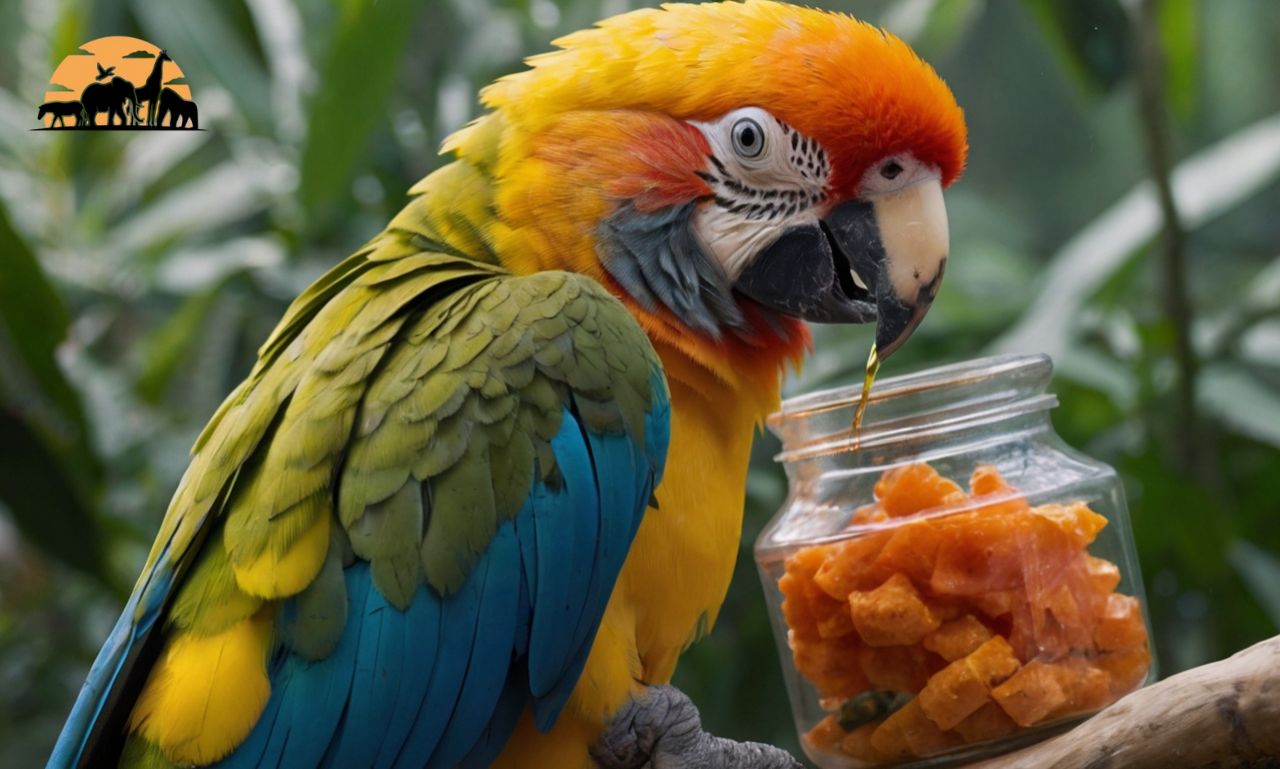Parrots are known for their intelligence, vibrant colors, and lively personalities. If you’re planning to adopt a parrot or are simply curious about these fascinating birds, understanding their dietary needs is essential. Parrots require a diverse and balanced diet to stay healthy, active, and mentally stimulated. This guide will explore what parrots eat, how to provide them with the right nutrients, and which foods to avoid.
Understanding a Parrot’s Natural Diet
In the wild, parrots have access to a variety of foods. Their diet includes fruits, nuts, seeds, flowers, and even occasional insects. Wild parrots have the freedom to choose foods that meet their nutritional needs, but pet parrots depend on their owners for a balanced diet. To replicate the varied diet they would find in nature, it’s essential to provide them with a mix of foods that mimic their natural diet and meet their nutritional requirements.

Key Components of a Balanced Parrot Diet
A parrot’s diet should consist of a combination of pellets, fresh fruits, vegetables, and some seeds or nuts as treats. Here’s a breakdown of each component:
- Pellets
- Why: Pellets are specially formulated to provide essential nutrients, including vitamins, minerals, and proteins.
- How Much: Ideally, pellets should make up about 50-60% of a parrot’s daily diet.
- Choosing Pellets: Look for high-quality pellets that are free of artificial colors, flavors, and preservatives. Different pellet types are available for different parrot species, so choose the one that best suits your bird’s needs.
- Fresh Fruits and Vegetables
- Why: Fruits and vegetables provide essential vitamins, minerals, and antioxidants. They are also an excellent source of natural sugars and fiber.
- How Much: Aim to make fruits and vegetables around 30-40% of your parrot’s diet.
- Best Choices: Leafy greens (like spinach, kale, and dandelion greens), carrots, bell peppers, broccoli, apples, berries, mango, and bananas are all excellent choices.
- Serving Tips: Wash fruits and vegetables thoroughly before feeding them to your parrot. Remove seeds from fruits like apples, as they can be toxic.
- Seeds and Nuts
- Why: Seeds and nuts are high in fats, proteins, and other nutrients that parrots enjoy, but they are best given in moderation.
- How Much: Seeds and nuts should make up only about 5-10% of the diet, reserved as treats or training rewards.
- Best Choices: Sunflower seeds, pumpkin seeds, almonds, walnuts, and cashews are good choices in small amounts.
- Serving Tips: Limit the quantity to avoid obesity, as seeds and nuts are high in fats. Always offer unsalted, unflavored varieties.
- Proteins
- Why: Parrots may need additional protein sources, especially during molting or breeding seasons.
- Sources: Small portions of cooked eggs, lean chicken, or even insects (like mealworms) can provide protein if needed.
- Serving Tips: Only offer protein-rich foods occasionally, as too much can be unhealthy.
What to Avoid Feeding Your Parrot
Not all foods are safe for parrots, and some common foods can even be toxic. Here are some items to avoid:
- Avocado: Contains persin, which is toxic to parrots and can be fatal.
- Chocolate: Contains theobromine, which is harmful to birds.
- Caffeine: Found in coffee, tea, and soda, caffeine can cause heart problems in parrots.
- Alcohol: Toxic to birds, and even a small amount can lead to serious health issues.
- Onions and Garlic: These contain compounds that can cause digestive issues and toxicity in parrots.
- Salty and Sugary Foods: Foods high in salt and sugar can cause dehydration and lead to kidney problems.
- Fruit Pits and Apple Seeds: Many pits and seeds, such as those in apples and cherries, contain cyanide-like compounds that are toxic to birds.
Always check the safety of new foods before feeding them to your parrot, and stick to fresh, clean, and unprocessed options.

Sample Daily Meal Plan for a Parrot
Here’s a sample daily diet for a medium-sized parrot, like an African Grey or Amazon parrot:
- Morning:
- ¼ cup of high-quality pellets
- A few pieces of fresh fruits like apple slices and berries
- Afternoon Snack:
- Small handful of leafy greens (spinach, kale) and vegetables like bell peppers and carrots
- Evening:
- ¼ cup of pellets
- 1–2 seeds or nuts as a treat, like an almond or a few sunflower seeds
- Occasional Protein (once or twice a week):
- Small piece of scrambled egg or lean chicken
This plan can be adjusted based on the size and activity level of your parrot. Avoid overfeeding seeds and nuts to maintain a balanced diet.
Read About What Do Birds Eat?
Tips for Feeding Your Parrot
- Variety is Key: Rotate fruits and vegetables to give your parrot a range of flavors and nutrients.
- Introduce New Foods Slowly: Parrots can be picky and may need time to get used to new foods. Introduce new items gradually to avoid upsetting their digestive system.
- Hydration: Ensure your parrot has access to fresh, clean water at all times. Some parrots may also enjoy an occasional sip of coconut water for added electrolytes.
- Clean Food and Water Dishes Daily: To prevent bacterial growth, clean your parrot’s food and water dishes daily.
- Monitor for Allergies or Reactions: Some parrots may have allergies to certain foods. Watch for signs like vomiting or changes in behavior and consult a vet if you notice any issues.
Watch
Conclusion:
A balanced diet is essential for your parrot’s health and happiness. By providing a mix of high-quality pellets, fresh fruits, vegetables, occasional seeds, and small amounts of protein, you can ensure that your feathered friend gets the nutrients they need. Remember to avoid foods that are toxic to parrots and always keep fresh water available.
With proper nutrition, your parrot will enjoy a vibrant, active life and stay healthy for years to come. Feeding your parrot can be a fun experience that strengthens your bond, so take the time to understand their dietary needs and offer them a varied, nutritious diet every day.
Read About Hypoallergenic Dogs
FAQs:
1. What should a parrot’s main diet include?
A parrot’s main diet should include high-quality pellets (50-60%), fresh fruits and vegetables (30-40%), and small amounts of seeds and nuts as treats (5-10%).
2. Can parrots eat all types of fruits and vegetables?
Most fruits and vegetables are safe, but avoid avocado, onions, and garlic, as they are toxic to parrots.
3. Are seeds and nuts safe for parrots?
Yes, seeds and nuts are safe but should be given in moderation due to their high fat content. They work best as occasional treats.
4. Can parrots have bread?
Yes, plain whole-grain bread is fine occasionally. Avoid added salt, sugar, and preservatives.
5. Is protein important in a parrot’s diet?
Yes, protein is essential, especially during molting. Small portions of scrambled eggs or cooked chicken can be offered occasionally.

